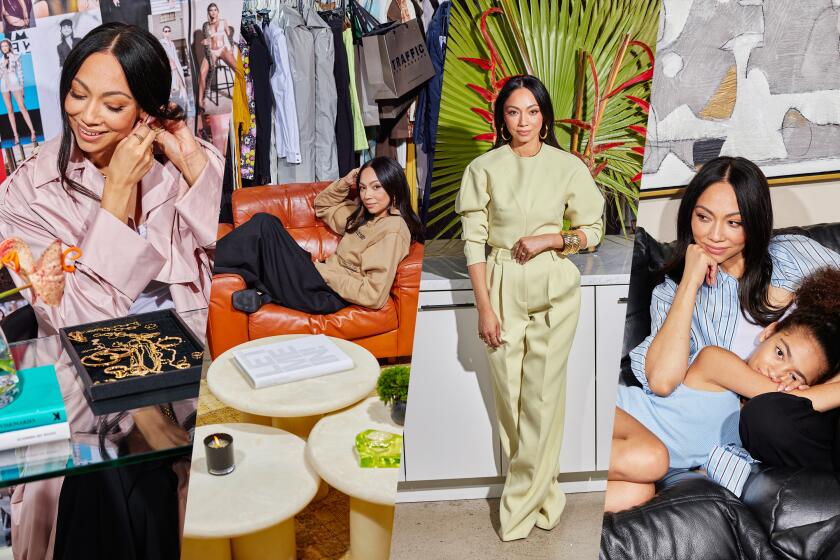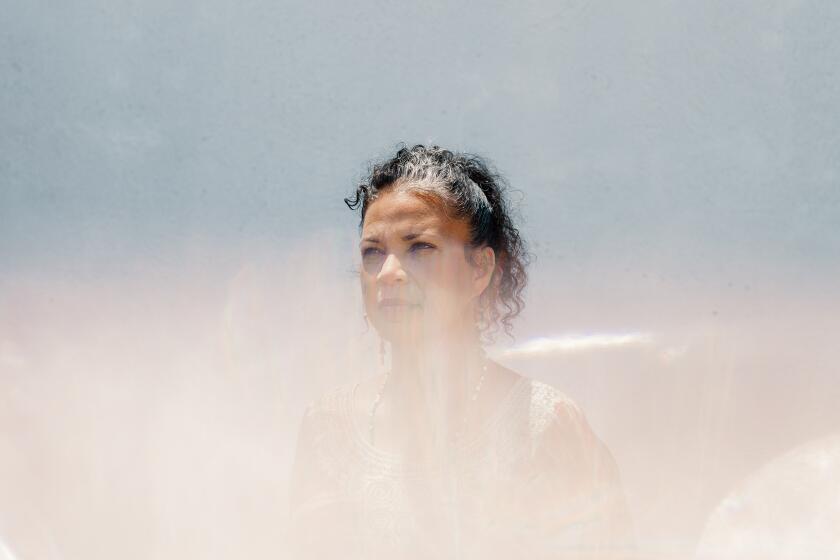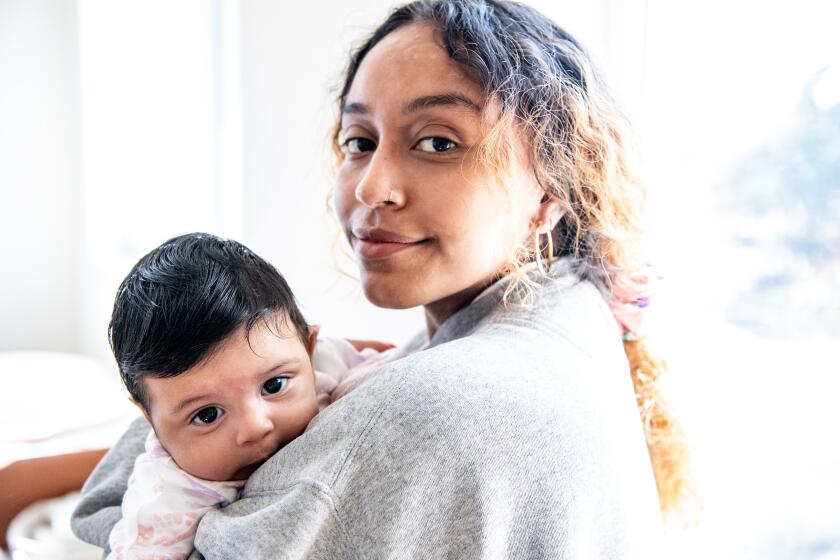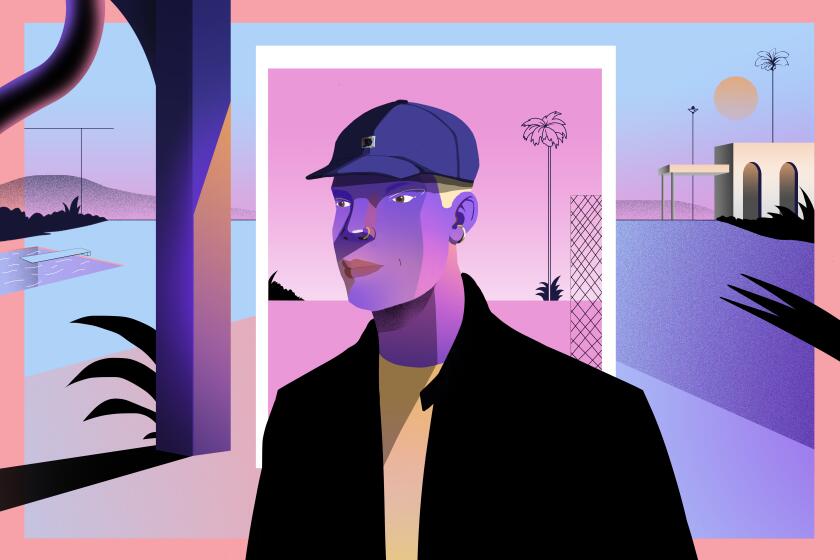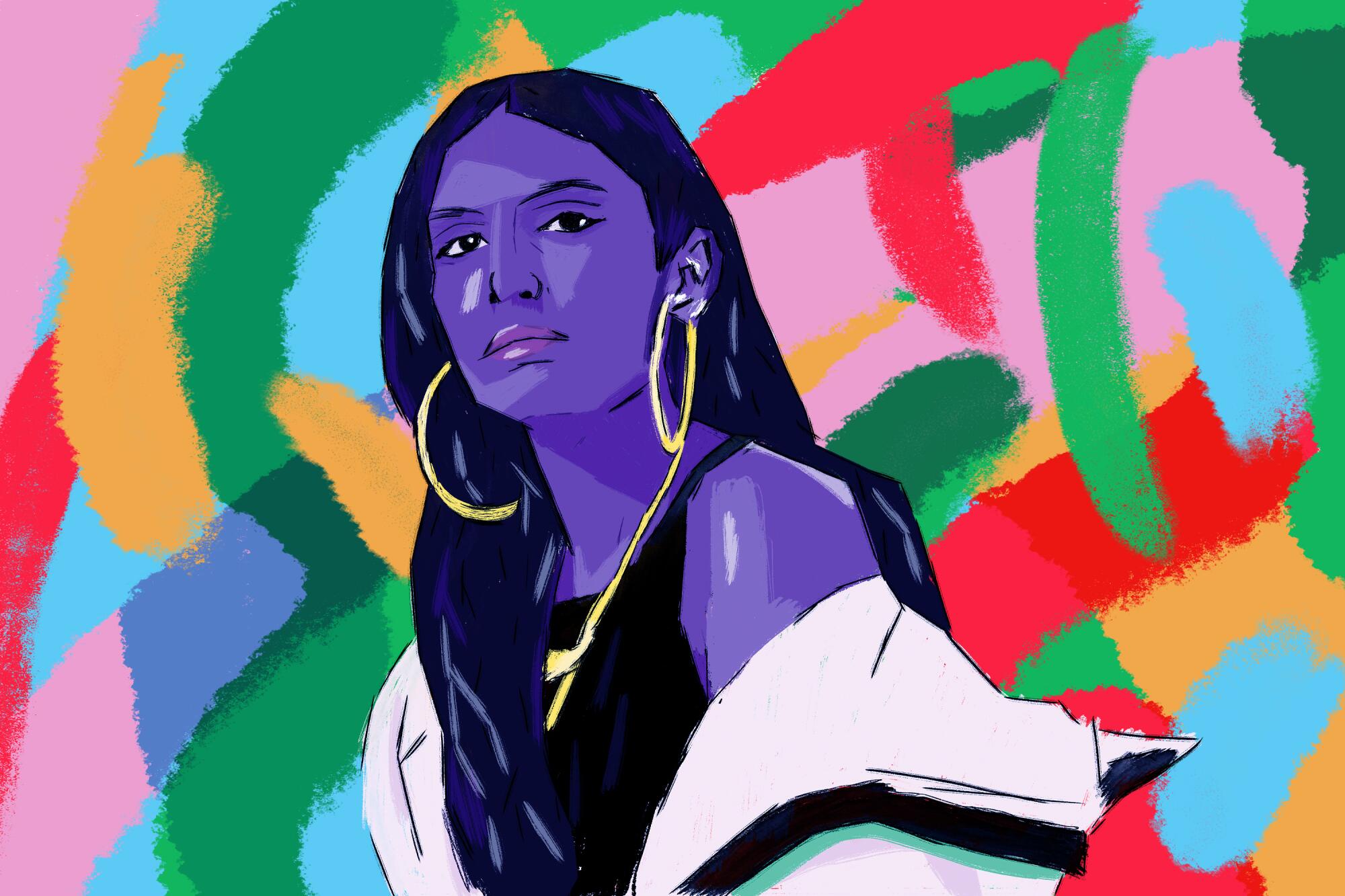
- Share via
This story is part of Parents are Cool!, the third issue of Image, which explores the myriad ways that L.A. parents practice the craft of care. See the full package here.
In March, Foot Locker named L.A.-based designer and entrepreneur Melody Ehsani its first women’s creative director. That one-of-one status came as a shock to her. She’s all for her products being limited editions — like the coveted Air Jordans she’s designed — but Ehsani is frustrated by the fact that, as a woman of color calling the shots at a global athletic wear company, she’s a rarity.
“I was kind of taken aback that they’d never done that,” Ehsani says of her new position at Foot Locker. “Like, how is that even possible?”
Born in Los Angeles to Iranian parents, the 41-year-old maven of sporty style is a standout female figure in the hype-beast community — those tantalized by hard-to-obtain sneakers and designer streetwear. After leaving law school, she launched her signature brand, ME., in 2007, specializing in jewelry and apparel with a pronounced “throwback” aesthetic. (Her goods are sold online and at her Fairfax Avenue flagship store, at prices that range from $25 to $170.)
Ehsani, who married Red Hot Chili Peppers bassist Flea in 2019, also has collaborated with Reebok and racked up co-signs from celebrity clients such as Serena Williams, Beyoncé and Yara Shahidi.
“I definitely thought it was time,” she says during a phone interview in early July. “In so many ways, it feels like we’ve come so far. But then, it’s kind of sobering to realize: Actually, we’re still under this very hetero, patriarchal system, and we’ve never experienced equality.”
You can see evidence of her impatience with said system in ME. pieces like the “Take a Bite Out of Patriarchy” tee and a brass ring that reads, “Pay Me,” referencing women’s ongoing struggle for equal pay. There’s also a topical throughline in the first capsule collection she designed for Foot Locker, which debuted in June. In the collection, you can find such femme-forward imagery as a pair of fleece shorts bearing a woman’s eye superimposed on a globe; a pair of sweatpants featuring feminine silhouettes dribbling basketballs; and an organza tracksuit, the product of a collaboration with the female-owned design house NorBlack NorWhite.
“The deeper I’ve gotten into this industry, the more I’ve been made aware of how many athletics companies have really factored women in, in a meaningful way, from the beginning,” Ehsani says. “There really aren’t any. So it definitely gives me a charge. It’s like, ‘OK, I got this. This is something I can do.’”
We spoke with the designer about her push for global girl power, both in her new corporate role and in her own line.
More stories from Image
Melina Abdullah talks to Angela Flournoy about how we can all get to freedom
These L.A. photographers offer a vision of what parenting can be
Dave Schilling unpacks L.A.’s obsession with dad hats
Jamilah Lemieux riffs on the L.A. wave of going topless in public
We picked some of the coolest parents in L.A. culture. Now you can pick which one you want to be
As a creative director for Foot Locker, what do you bring to the table?
I sit at a strange intersection, in terms of being a consumer and then also being a creator, being somebody who’s really passionate about community-building and somebody that understands sports and has played sports. I have this universalist vantage point that allows me to look at everything from a different bird’s-eye view. I think that’s important, from a cultural perspective and a business perspective.
Do you feel there’s a parallel between what you’ve dealt with as a woman working in the male-dominated athletic wear industry and what female athletes have been speaking out against lately?
We all have so much more in common than we think. We’re just dealing with it in our own arenas. With the WNBA this last year, so much was exposed about the types of conditions that they were playing under, the fact that they couldn’t even get gym equipment, and when they traveled, they were four to a room. It was just insane, especially when you compare it to the NBA. I can relate to that in my own arena. It’s the design of the system. But what makes me so excited is the big paradigm shift that’s occurring.
Hollywood stylist Monica Rose is changing L.A. fashion
What was on your mood board when you started to design for Foot Locker?
The mood board was a little all over the place, but when you look at the collection, you see that I hybrided it all together. I was really deep into researching climate change, so I was obsessed with these different heat pattern maps. I pulled in a bunch of thermal patterns, because I loved all the colors and the way the waves looked at the different elevations. I was also thinking a lot about the WNBA, so I had images of Sheryl Swoopes on there and T’ea Cooper. I was thinking of different girls around the world playing basketball. I wanted to bring in this idea that women have the power to change the world. It could be through basketball. … It could be through anything.
What can we expect from the next capsule?
We’re doing four collections a year for the next two years. I actually don’t know when the next one is going to drop, but I feel like it’s going to be around back-to-school time. To be honest, I don’t even remember which one is coming next, just because I’ve designed so many in a silo. But I’m carrying forward the same theme, which is my belief that if women banded together around the world, we could achieve a greater level of existence on the planet. It’s never going to be handed over. It’s something that we’re going to have to continue to demand and take ownership of. That’s what drives me to continue to put those messages out there, because it’s not something we can be complacent about. We have to stand in our light all the time and honor it. Really hold our own so that we receive the things we know we’re owed and entitled to, just as human beings.
How do your Foot Locker designs compare to those in your signature brand?
Theme-wise, they definitely dovetail each other. My messaging is the same. With my own brand, I’m not under a corporation, so I can be a little bit more free. Like, if I want to be more spiritual with my messaging. Even though Foot Locker hasn’t imposed anything on me, I just feel like I’ve given myself more agency to do that with my own brand. They also sit at different price points; they’re both affordable, but the Foot Locker stuff is more so. The materials and fabrications are different, and I guess it is a little bit more sports-focused, whereas my stuff skews more toward lifestyle.
If women banded together around the world, we could achieve a greater level of existence on the planet
— Melody Ehsani
What kind of customer embodies that lifestyle?
We’ve been doing this brand exercise to try to figure out, “Who is our girl?” And it’s so difficult, because we sometimes have girls who are 12 and 13 wear our stuff and post it on Instagram. And then, on the flip, we have women in their 70s who wear our stuff. Like, we’ll have Susan Sarandon come in and buy a pair of earrings. It’s such a wide range that I actually don’t know how to articulate “our girl” yet. But I definitely think she’s ageless.
What’s next for ME.?
We’re branching out our product line. For the longest time, we just did jewelry. Then we started making apparel a couple of years ago. Then, just this last year, we started doing more cut-and-sew apparel. Last year, we had 10 pieces in our collection. This year, we’re doubling that. And we’re also increasing the product offerings, like, maybe some home goods. We’ve sort of been sprinkling things in, like a little rug we released this last spring.
There has been a lot of discussion about size inclusivity in the fashion world recently. Is that something you’re factoring in as ME. branches out?
I really don’t understand why bigger brands don’t offer [inclusive size ranges], because they have the infrastructure to be able to support it. Whereas, for us, it’s a lot trickier. Any time we add a new size, it’s a really big deal, because it’s really expensive and requires a lot of trial and error. We’ve been playing around with photographing stuff on different size models, which I think is really important, because that determines whether there’ll be a demand. In our last couple of campaigns, we’ve used bigger girls, and the 2Xs flew so much faster. We just started selling out of them, so now we feel comfortable moving on to 3X. It’s just a much slower process that requires a lot of time and research.
